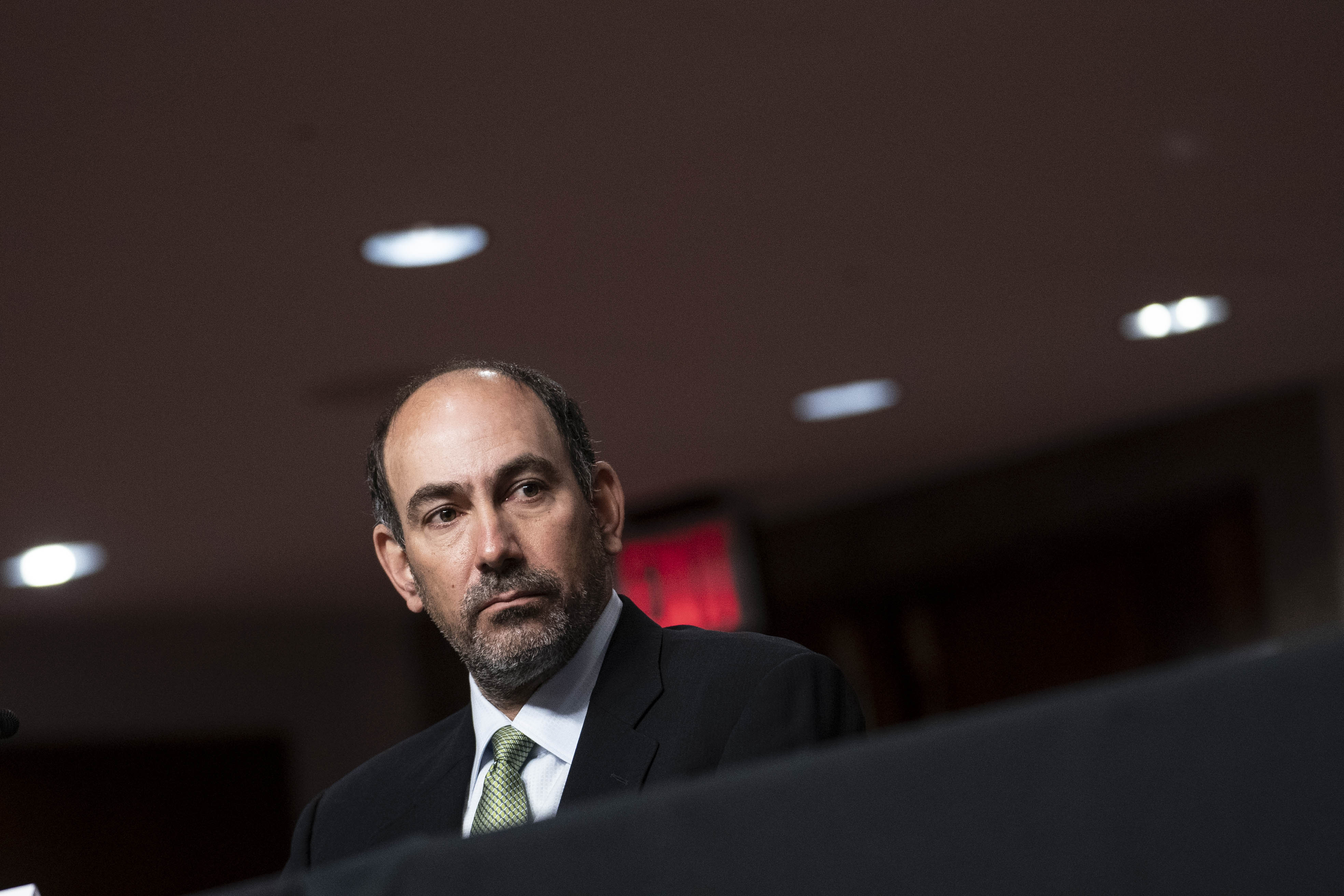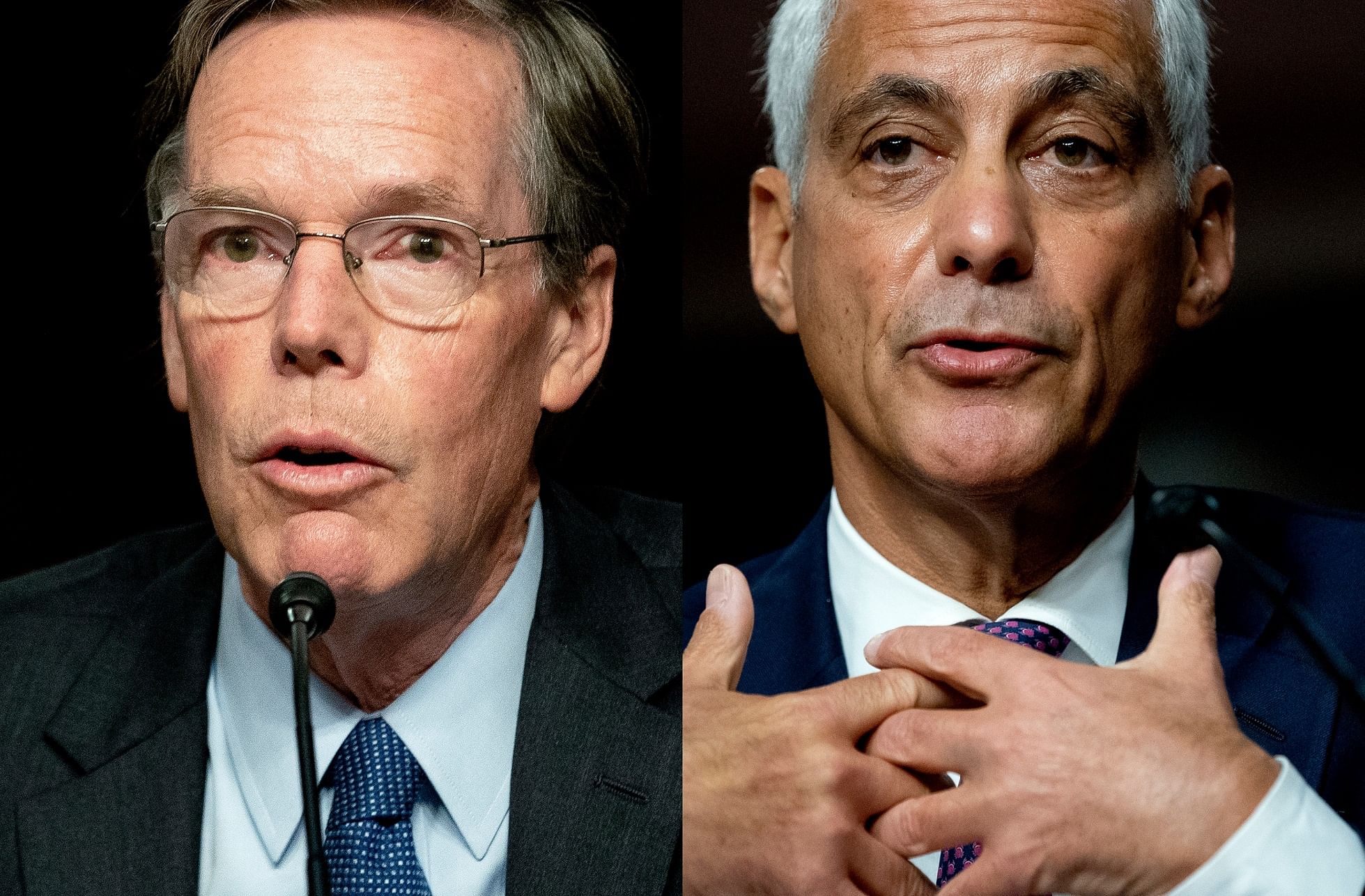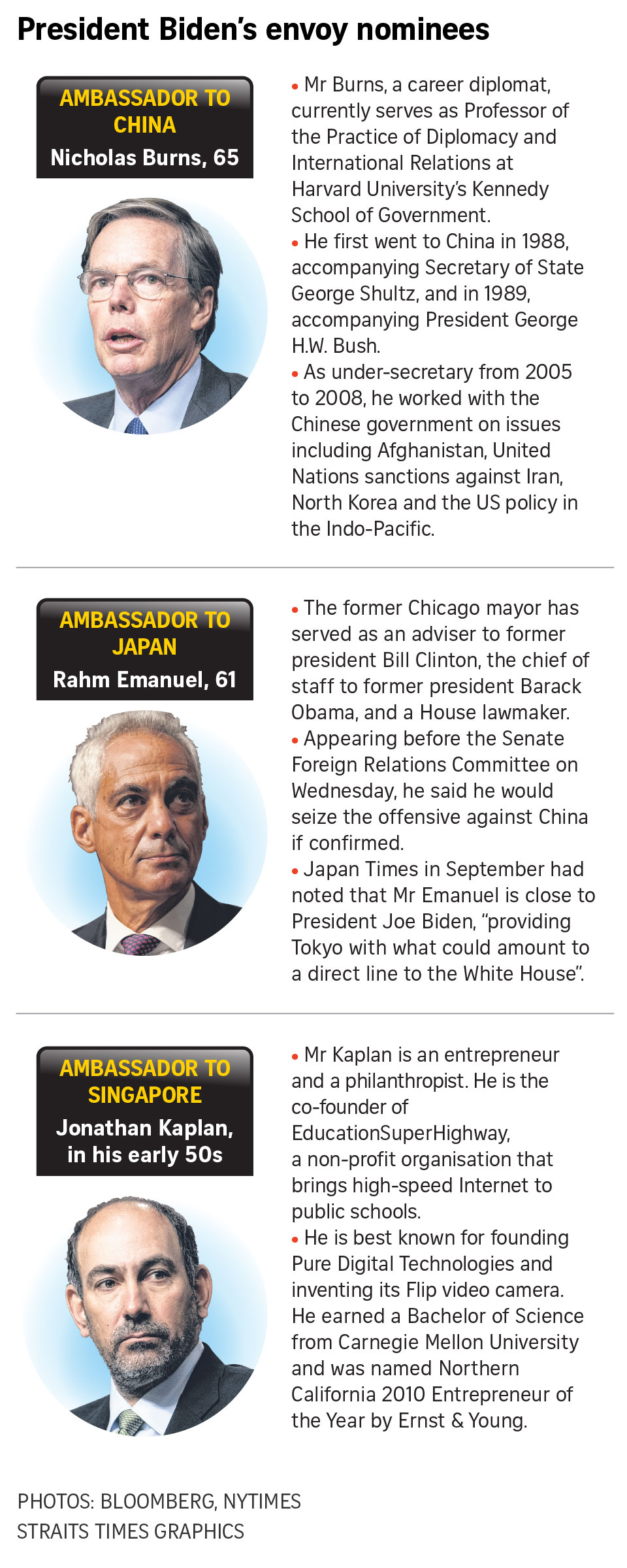Senate examines Biden’s ambassador picks to Singapore, China, Japan
Sign up now: Get ST's newsletters delivered to your inbox

US ambassador to Singapore nominee Jonathan Kaplan listens during a Senate Foreign Relations Committee confirmation hearing in Washington, on Oct. 20, 2021.
PHOTO: BLOOMBERG
WASHINGTON - With an eye on a rising China, Washington moved to fill its vacant ambassadorships to key countries in Asia on Wednesday (Oct 20) when a United States Senate panel held a long-awaited hearing to confirm President Joe Biden's picks for ambassadors to Singapore, China and Japan.
Singapore's partnership with America is critically important to strengthening Washington's presence in the Indo-Pacific region, said technology entrepreneur Jonathan Kaplan, Mr Biden's nominee for US ambassador to Singapore.
"If confirmed, I plan to strengthen our bilateral trade relationship and advance an economic agenda that promotes a shared prosperity, further secure our economic resiliency and access to supplies, and work closely with Singapore to tackle the climate crisis," Mr Kaplan, who is in his early 50s, told the Senate Foreign Relations Committee.
"And if confirmed, I look forward to the opportunity to strengthen our security cooperation and defend the rules-based international order, which has supported peace and prosperity in the Indo-Pacific region," he added.
At Wednesday's confirmation hearing, the Senate panel also questioned career diplomat Nicholas Burns, the nominee for ambassador to China, and former Chicago mayor Rahm Emanuel, the nominee for ambassador to Japan.
Analysts have been critical that these ambassadorial posts remained unfilled nearly a year into the Biden presidency, despite their importance to America's foreign policy as competition with China heats up.
Two Republican senators, Mr Ted Cruz and Mr Josh Hawley, have held up the confirmation process for months in protest over Mr Biden's foreign policy decisions, but Wednesday's hearing was an encouraging sign that the gridlock had been broken.
Mr Kaplan's hearing follows a string of visits by top officials to South-east Asia in recent months, notably Defence Secretary Lloyd Austin in July and Vice-President Kamala Harris in August, as the Biden administration ramps up US engagement with the region.
Democratic senator John Hickenlooper of Colorado said that Mr Kaplan's experience as an innovator and entrepreneur put him in good stead to represent America in Singapore.
"Both of our countries are diverse, multicultural hubs of innovation, grappling with the looming threat of climate change and the rise of China," said Mr Hickenlooper in his introduction of Mr Kaplan.
"It's essential to have someone of great quality to steer this partnership at such a sensitive moment. That leader we have in Jonathan Kaplan," he added. "He is a tested entrepreneur who understands the importance of bringing people together to achieve common goals."

The Senate panel also questioned career diplomat Nicholas Burns (left), the nominee for ambassador to China, and former Chicago mayor Rahm Emanuel, the nominee for ambassador to Japan.
PHOTOS: NYTIMES
While senators placed less emphasis on competition with China in their questions to Mr Kaplan compared to other nominees, they, nonetheless, referred to it from time to time.
"Singapore is central for our engagement in South-east Asia and with Asean, and success in South-east Asia is central to our success in the Indo-Pacific and with our challenge with China," said Democratic Senator Robert Menendez of New Jersey, who chairs the foreign relations committee.
Mr Kaplan was also grilled on his approach to Singapore's press freedom record, with three senators citing Singapore's position of 160 - out of 180 - in this year's World Press Freedom Index.
Mr Kaplan promised to make his office available to press freedom advocates and to engage with the Singapore Government on the issue.
"They may not want to change, we're going to want them to change, but we're going to have a dialogue. This is an area of fundamental freedoms, this is a topic of importance for the administration, and this is a priority for me," he added.
Congressional gridlock
The appointment of a US ambassador to Singapore should boost Washington's trade and diplomatic engagement in the region, which has somewhat stalled, said analysts.
The post has been empty since January 2017, when the previous ambassador Kirk Wagar, who was appointed by Democratic president Barack Obama, left his post following Republican president Donald Trump's inauguration.
This vacancy has gotten in the way of the US deepening diplomatic and economic engagement with the region, said Mr Menendez at the hearing.
"When we have not had a confirmed ambassador in Singapore for almost five years now, it's tough to have diplomatic engagement, which underscores the importance of getting you in place as soon as possible," Mr Menendez told Mr Kaplan.
Hudson Institute Asia-Pacific security chairman Patrick Cronin told The Straits Times: "It is hard for even well-informed Americans to understand why the US confirmation process is broken. But the world has even less understanding why the United States would leave ambassadorial posts to key allies and partners like Japan and Singapore gapped for two and five years, respectively.
"This systemic failure to confirm senior officials in a timely fashion was apparent even before the growing divisiveness in US politics undermined the traditional bipartisan consensus in foreign policy."
Dr Cronin added: "Today, it is far too common for a single senator to hold up scores of nominations without any serious justification."
Still, if the Senate finally does its job this month, the US will, at last, have an elite group of envoys in Beijing, Tokyo, and Singapore, said Dr Cronin, calling the capitals "three of the most vital embassies in the world".
"The embassy personnel at those posts will have a leader who can speak with greater authority, communicate directly with President Biden, and help integrate diplomacy with major policy initiatives," he said.
Dr Cronin said he expected Mr Burns, Mr Emanuel, and Mr Kaplan all to be confirmed, and to be headed to their posts as early as next month and certainly by the start of next year.
Analysts have lamented America's relative lack of an overarching trade strategy in South-east Asia, compared to its more robust security cooperation, and compared to China's deepening economic integration with the region.
Beijing last month applied to join the Comprehensive and Progressive Agreement for Trans-Pacific Partnership, an earlier version of which Washington pulled out from in 2017. China is also part of the Regional Comprehensive Economic Partnership free trade agreement, while the US is not.
Mr Menendez echoed these concerns at the hearing, saying: "More attention is needed in South-east Asia, including on issues like regional trade engagement and economic statecraft.
"At the end of the day, how we integrate with the region's political economy is far more consequential than our military or security presence alone."
Dr Cronin said that filling the ambassadorial posts would accelerate high-level consultations between South-east Asia and the US.
"For Singapore, I think the main benefit will be to elevate Singapore's voice in the making of US regional policy, and that could bode well for greater emphasis on trade," he said.



